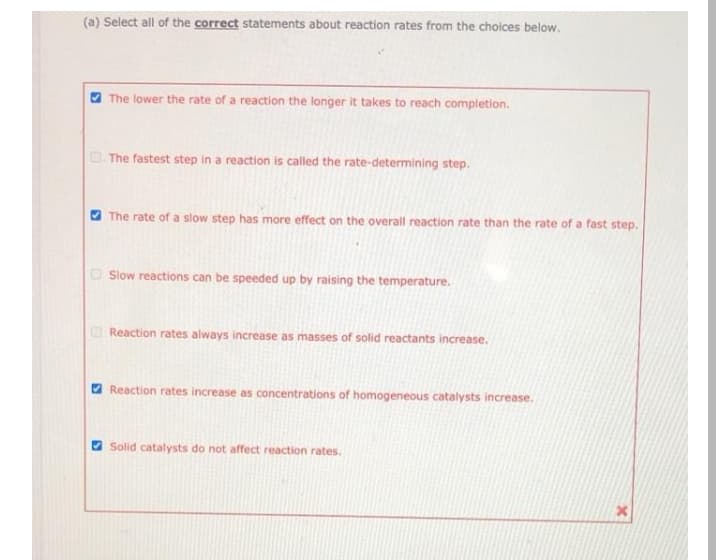(a) Select all of the correct statements about reaction rates from the choices below. The lower the rate of a reaction the longer it takes to reach completion. O. The fastest step in a reaction is called the rate-determining step. O The rate of a slow step has more effect on the overall reaction rate than the rate of a fast step. O Slow reactions can be speeded up by raising the temperature. O Reaction rates always increase as masses of solid reactants increase. O Reaction rates increase as concentrations of homogeneous catalysts increase. Solid catalysts do not affect reaction rates.
(a) Select all of the correct statements about reaction rates from the choices below. The lower the rate of a reaction the longer it takes to reach completion. O. The fastest step in a reaction is called the rate-determining step. O The rate of a slow step has more effect on the overall reaction rate than the rate of a fast step. O Slow reactions can be speeded up by raising the temperature. O Reaction rates always increase as masses of solid reactants increase. O Reaction rates increase as concentrations of homogeneous catalysts increase. Solid catalysts do not affect reaction rates.
Introductory Chemistry: A Foundation
9th Edition
ISBN:9781337399425
Author:Steven S. Zumdahl, Donald J. DeCoste
Publisher:Steven S. Zumdahl, Donald J. DeCoste
Chapter17: Equilibrium
Section: Chapter Questions
Problem 9CR
Related questions
Question
6

Transcribed Image Text:(a) Select all of the correct statements about reaction rates from the choices below.
The lower the rate of a reaction the longer it takes to reach completion.
O The fastest step in a reaction is called the rate-determining step.
The rate of a slow step has more effect on the overall reaction rate than the rate of a fast step.
O Slow reactions can be speeded up by raising the temperature.
O Reaction rates always increase as masses of solid reactants increase.
Reaction rates increase as concentrations of homogeneous catalysts increase.
Solid catalysts do not affect reaction rates.
Expert Solution
This question has been solved!
Explore an expertly crafted, step-by-step solution for a thorough understanding of key concepts.
This is a popular solution!
Trending now
This is a popular solution!
Step by step
Solved in 2 steps with 2 images

Recommended textbooks for you

Introductory Chemistry: A Foundation
Chemistry
ISBN:
9781337399425
Author:
Steven S. Zumdahl, Donald J. DeCoste
Publisher:
Cengage Learning


Chemistry
Chemistry
ISBN:
9781305957404
Author:
Steven S. Zumdahl, Susan A. Zumdahl, Donald J. DeCoste
Publisher:
Cengage Learning

Introductory Chemistry: A Foundation
Chemistry
ISBN:
9781337399425
Author:
Steven S. Zumdahl, Donald J. DeCoste
Publisher:
Cengage Learning


Chemistry
Chemistry
ISBN:
9781305957404
Author:
Steven S. Zumdahl, Susan A. Zumdahl, Donald J. DeCoste
Publisher:
Cengage Learning

Chemistry: The Molecular Science
Chemistry
ISBN:
9781285199047
Author:
John W. Moore, Conrad L. Stanitski
Publisher:
Cengage Learning

Chemistry for Engineering Students
Chemistry
ISBN:
9781337398909
Author:
Lawrence S. Brown, Tom Holme
Publisher:
Cengage Learning
